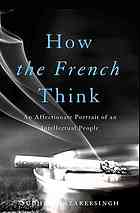
How the French Think
An Affectionate Portrait of an Intellectual People
کتاب های مرتبط
- اطلاعات
- نقد و بررسی
- دیدگاه کاربران
نقد و بررسی

July 20, 2015
Hazareesingh (The Legend of Napoleon), a professor of politics at Balliol College, Oxford, comes close to producing an intellectual history of modern France, from René Descartes to such poststructuralist thinkers as Claude Lévi-Strauss and Michel Foucault. But it is not quite that; instead, Hazareesingh addresses broad themes in French thought, including the “interplay... between the cold linearity of Descartes and the unbridled expansiveness of Rousseau”; the “lively French tradition of dissent, contrarianism, and impertinence”; the widespread belief in “providential leadership” that has fueled the rise of individuals from Napoleon to de Gaulle; and the “declinist sensibility” in recent French thought as manifested in the writings of such figures as Éric Zemmour and Alain Finkielkraut. Hazareesingh also offers a surprising insight on the extent of supernaturalism in French thought and politics, noting that, despite a longstanding French commitment to rationalism, leaders from Robespierre to Mitterrand have consulted astrologers. The main weakness of Hazareesingh’s book is that he covers too much ground in not enough space and in the process assumes of his readership too much familiarity with French thinkers. Despite this flaw, this is an equally informative and colorful tour d’horizon of the many strands of, and contradictions in, French philosophy and political thought during the past four centuries.

July 1, 2015
A dense, thoughtful study by a Mauritius-born native achieves the right distance from and intimacy with his subject. While sharing enormous sympathies with the French language and culture, Hazareesingh (Politics/Balliol Coll., Oxford; The Legend of Napoleon; In the Shadow of the General, 2005, etc.) also maintains his academic reserve. In a series of scholarly essays, the author probes the intellectual currents that have fed that distinctive esprit francais since the time of Louis XIV to the more pessimistic present. Indeed, the Grand Siecle saw not only the apotheosis of absolute monarchy at Versailles, dazzling intellectual salons, fashion, and cuisine, but also the epoch of Descartes, the philosopher who set out the rationalist tug of war between mind and matter, soul and thought that would plague and elate the French ever since. The author looks at how the writing of Descartes was appropriated by many different, conflicting parties over the centuries, from Christian to anticlerical to feminist, but celebrated as the "emblem of republican rationalism" that would triumph with the French Revolution. French thought is nothing if not contradictory, and while the Enlightenment thinking ushered in a "detached, skeptical and critical self," Hazareesingh also emphasizes the long French flirtation with the occult and supernatural, culminating in President Francois Mitterrand's obsession with astrological predictions. Fantasies of utopia, from Rousseau to Victor Hugo, dovetail nicely with the French proclivity for scientific inventiveness, precision, and accuracy, while the concepts of left and right that rupture French politics to this day are deeply rooted in the French Revolution. Naturally, the cult of Napoleon garners its own chapter. The new pessimism that the author attempts to articulate seems to emanate from France's acute awareness of its slipping relevance in world influence-certainly next to the English language and American culture-and a deep anxiety over immigration and its ruling elite. A rarefied and compelling study.
COPYRIGHT(2015) Kirkus Reviews, ALL RIGHTS RESERVED.

























دیدگاه کاربران